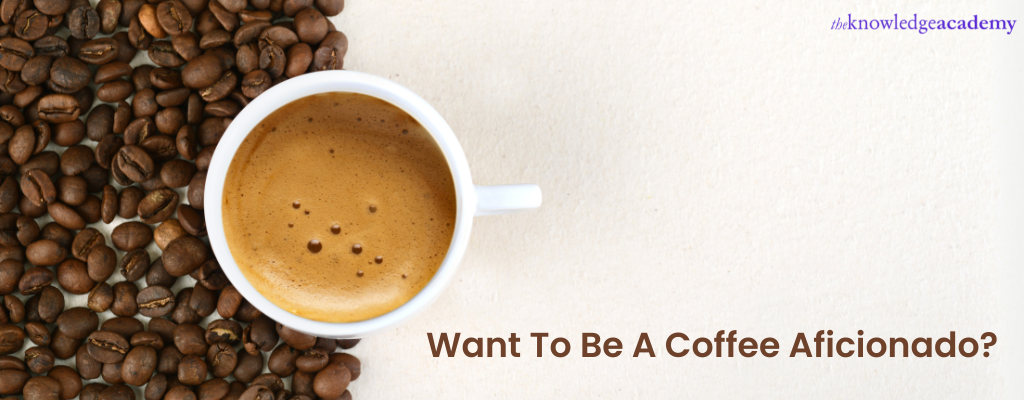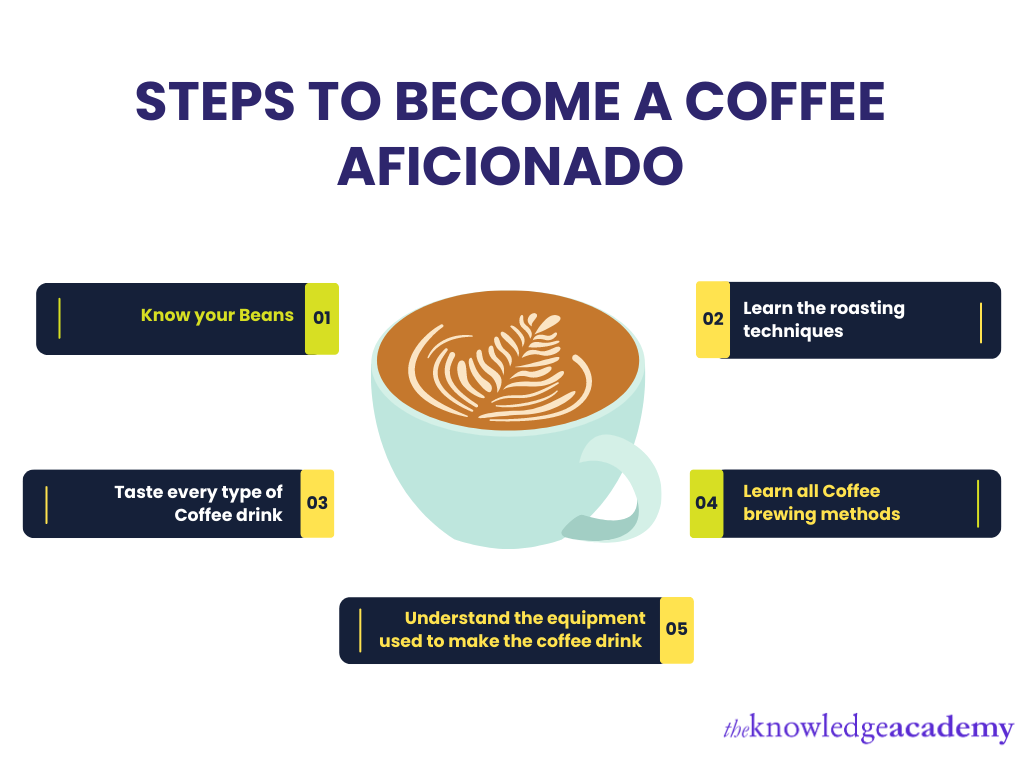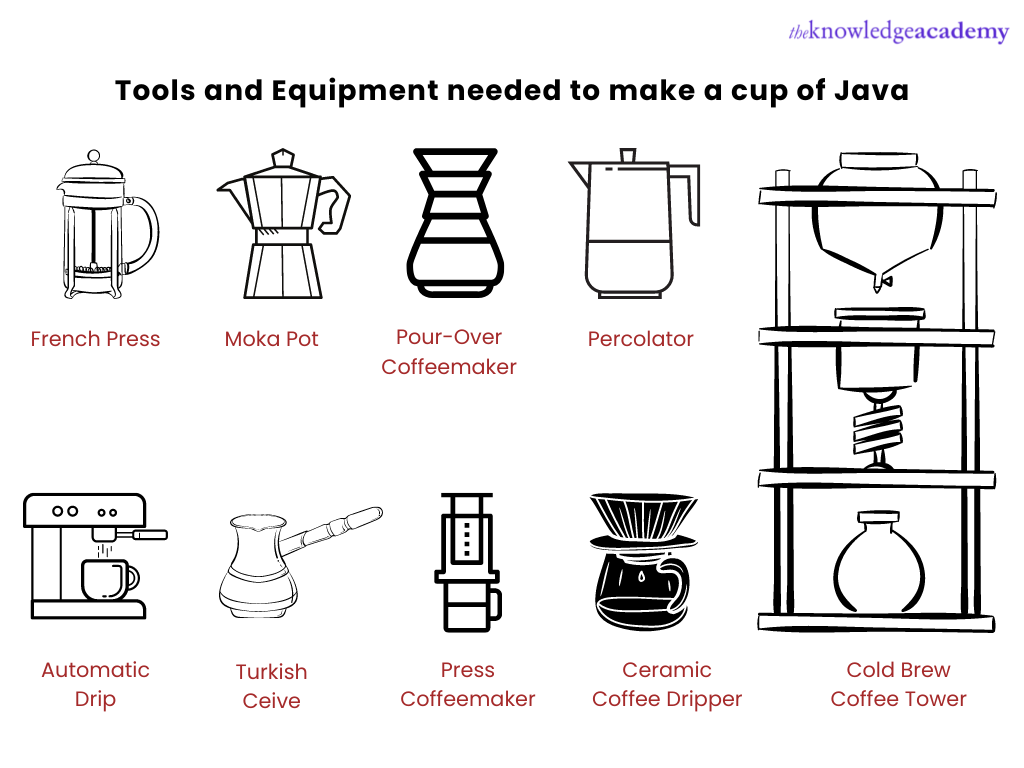We may not have the course you’re looking for. If you enquire or give us a call on 44 1344 203 999 and speak to our training experts, we may still be able to help with your training requirements.
Training Outcomes Within Your Budget!
We ensure quality, budget-alignment, and timely delivery by our expert instructors.

The world of Coffee is a very interesting one. One gets to taste and drink several varieties of Coffee drinks made with different methods. The Centre for Economics and Business Research states Britishers drink 95 million cups of Coffee annually. Instant Coffee for in-home consumption is used in the UK, but ground and speciality Coffee are also becoming popular. If you're among the millions of Coffee lovers worldwide, this is the right time to step up your Coffee game and become an Aficionado of the drink.
Do you want to become a Coffee Aficionado? Check out this article. Here, we will discuss the tips and tricks required to become a Coffee Aficionado.
Table of Contents
1) Who is a Coffee Aficionado?
2) How to become a Javaphile?
a) Know your beans
b) Learn the roasting techniques
c) Taste every type of Coffee drinks
d) Learn all Coffee brewing methods
e) Understand the equipment used to make the Coffee drink
3) Conclusion
Stay up to date with trends in the Coffee brewing field with Industry Training. Join now!
Who is a Coffee Aficionado?
Coffee is loved and enjoyed by several people, thus making it one of the most consumed beverages in the world. Individuals who like Coffee are called Coffee Aficionados. It is a Spanish word, meaning 'fond of' and is derived from 'afiction', which means 'affection'. Such individuals are also called Javaphile, Coffeeholics, Coffee Addicts or Javaphile. Java is a popular slang for Coffee, and adding the term 'phile' indicates liking the beverage.
These are the people who like and enjoy every aspect of Coffee. Passion towards the beverage is the way to identify a Coffeeholic from the rest of the people. A person who knows the different types of beans, roasts, brewing methods, and every kind of Coffee drink, then the individual can be called a Coffee lover.
How to become a Javaphile?

Statista reports a vast majority of people in the UK consume at least two cups of Coffee every day of the week. As ground and specialty Coffee are becoming popular in the country, the culture of Javaphile or Coffeeholics is also picking up pace. However, to become a Javaphile, you must learn and understand every aspect of Coffee.
Follow the below steps to become a Coffee Aficionado/ Javaphile:
Know your beans
The first and key requirement to become a Coffeeholic is that you must know the different types of Coffee beans. You cannot make an excellent cup of Java if you don't understand the various beans. Following are the four popular Coffee beans, and you need to understand and possess knowledge of at least all of them.
a) Arabica: These beans are softer and have a sweeter taste than all other species of beans. Additionally, it is the least acidic of all the beans. It is usually grown in high-altitude areas with a lot of rain, such as Brazil.
b) Robusta: These are some of the most popular beans and are primarily used in Espresso and Espresso-based Coffee drinks, such as Cappuccino and Lattes. Robusta beans produce a creamy layer (Crema) than Arabica beans. They have a bitter flavour profile, and their aftertaste feels like peanuts. Robusta beans-based drinks are often consumed as espresso shots when you need to boost energy, as their caffeine content is high.
c) Liberica: They are known to have a bitter and wood-like (woodsy) flavour. These beans are scarce and are not popular in America and Europe as opposed to the Philippines, Indonesia, and Malaysia.
d) Excelsa: These are the rarest Coffee beans and are grown mainly in Southeast Asia. As they are rare, they account for only a small portion of the world's Coffee consumption. These beans have a fruity flavour with a tart-like aftertaste.
Learn the roasting techniques
The second-most vital requirement to be called a Coffeeholic is to learn the different roasting techniques. There are four main types of roasts, as shown below:
a) Light roast: This roasting method produces beans of light brown colour with high acidity and caffeine levels.
b) Medium roast: Beans roasted in this method are of medium brown colour with moderate caffeine levels. Additionally, the acidity, aroma, and flavours are balanced.
c) Medium-Dark roast: Beans roasted in this method are of medium brown colour. These beans are full of flavour but have low acidity levels.
d) Dark roast: This roasting method makes the beans dark brown with an oily gloss. The caffeine levels of such beans are the lowest, and they taste bitter with a smoky aftertaste.
Taste every type of Coffee drink
You might have a personal favourite Coffee drink, but to become a Coffee Addict, you must know the taste of every kind of Coffee drink. Following are some of the commonly known and popular types of Coffee beverages.
a) Espresso: It is one of the most popular Coffee drinks. It comprises beans of different roasts, creating a bold and intense flavour. Additionally, espresso is the base of many other Coffee drinks.
b) Macchiato: It is a simple espresso shot with a topping of foam.
c) Latte: It includes one or two espresso shots with steamed milk and some foam. It is served in a glass instead of a mug like the other Coffee beverages.
d) Café au Lait: It consists of brewed Coffee and steamed or warmed milk in equal parts. The drink originated in France, and its literal translation is Coffee with milk, as these are the only two ingredients used.
e) Americano: This drink is made by mixing hot water and espresso shots. The beverage can be of different strengths, depending on the person. It can be made with one, two, or even three espresso shots.
f) Cappuccino: It consists of equal parts of espresso, hot milk, and foamed milk. This drink is commonly topped with either chocolate or cocoa powder.
g) Mocha: It is a favourite drink among chocolate fans. It is a combination of espresso, steamed milk, and chocolate.
Learn all Coffee brewing methods
A true Coffee lover should also know the different methods of brewing. The brewing method depends on the how you make Coffee. Following are some of the commonly known methods:
a) Pour Over Coffee: In this method, the Coffee is made by hand instead of by machines. Such Coffee can be made with either Chemex or Coffee Cone process, but both brewing techniques remain the same. You should pour hot water over the grounds and let it drip into a cup or carafe. This method results in a flavourful cup of Coffee.
b) Siphon: It involves the use of a dual-chambered vacuum pot. Water is filled in the bottom chamber, and Coffee grinds are put in the top compartment. The hot vapour forms circles of water through the upper chamber and brews the Coffee. Once the pot is removed from heat, the Coffee is sucked into the carafe as the lower section cools.
c) Espresso: It is not just a type of Coffee drink; it is a method as well. The espresso machines emulsify the Coffee oils and extract the solids very quickly. This pressure gives the Coffee a thick consistency and a more concentrated flavour.
Understand the equipment used to make the Coffee drink

The last step to becoming a true Coffeeholic is knowing the different equipment used to roast and brew Coffee. This knowledge will help you select the right equipment and tools and make a flavourful cup of Java. For making an excellent cup of Coffee, you must know the difference between a Chemex for pour-over Coffee, a stovetop pot for Turkish Coffee and a percolator. Without such knowledge, you won't be able to show your passion towards Coffee.
Conclusion
After reading this blog, we hope you understand how to become a Coffee Aficionado and show your passion for Coffee to the world.
Understand the origins of Coffee beans, and learn how to make the perfect cup of Java with Basic Barista Course. Join now!
Frequently Asked Questions
Upcoming Business Skills Resources Batches & Dates
Date
 Basic Barista Course
Basic Barista Course
Fri 17th Jan 2025
Fri 7th Mar 2025
Fri 23rd May 2025
Fri 18th Jul 2025
Fri 12th Sep 2025
Fri 14th Nov 2025
Fri 12th Dec 2025







 Top Rated Course
Top Rated Course




 If you wish to make any changes to your course, please
If you wish to make any changes to your course, please


